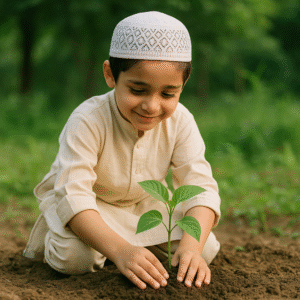The environment is everything that surrounds us—air, water, trees, animals, and even the land beneath our feet. It is our home, our source of life, and the foundation of every living thing on Earth. But today, we face a serious crisis. We are warming the planet, polluting rivers, cutting down forests, and driving species to extinction.

Every year on June 5, people around the world observe World Environment Day. They reflect on the planet’s health and consider how their actions affect the world around them. For Muslims, however, caring for the environment goes beyond one day. Islam teaches us to respect nature every day. Our faith calls us to live in harmony with the Earth and to protect it as an act of worship. In Islam, environmental care is not optional.
Allah says in the Qur’an:
“Indeed, I will make upon the earth a successive authority (khalifah).”
— Surah Al-Baqarah (2:30)
Allah appoints humans as khalifah, stewards of the Earth. He gives us the responsibility to manage, protect, and preserve the environment. He doesn’t allow us to exploit or abuse it. When we pollute or waste, we violate the trust (amanah) Allah placed in us. Islam makes environmental care a duty. It tells us to conserve water, avoid waste, treat animals kindly, and maintain balance in nature. These actions aren’t just good deeds, they are forms of worship that show our gratitude to Allah.
Prophetic Teachings on the Environment
The Prophet Muhammad ﷺ was an environmental role model long before modern climate discussions began. His actions and teachings reflect deep care for nature:
- He planted trees and encouraged others to do so. “Planting a tree is charity when any creature benefits from it.” — Bukhari, Muslim
- He prohibited cutting trees unnecessarily-even during war.
- He ensured clean water sources and forbade contaminating rivers or stagnant water.
- He promoted animal rights, forbidding cruelty and emphasizing mercy.
Environmental Care Through Daily Sunnahs
Here are simple, eco-friendly acts from the Sunnah (tradition of the Prophet ﷺ):
Turn off lights and taps when not in use.
Use reusable bags and containers.
Plant a tree—make it an act of charity.
Support local and organic produce.
Reduce plastic and food waste.
Teach children to love and care for nature.
Conclusion
For Muslims, protecting the environment is not just an ethical issue-it is a form of worship. Every act that preserves life, protects nature, or reduces harm is rewarded by Allah. At MeemAcademia.com, we believe in nurturing this deep connection between faith and environmental responsibility, helping students understand that caring for the Earth is part of their Islamic identity.
“The world is green and beautiful, and Allah has appointed you as His stewards over it.”
(Hadith – Sahih Muslim)
